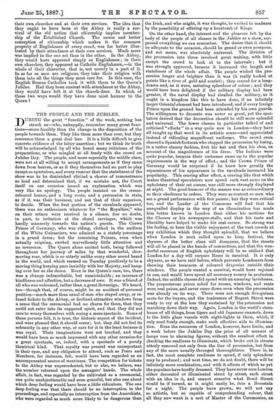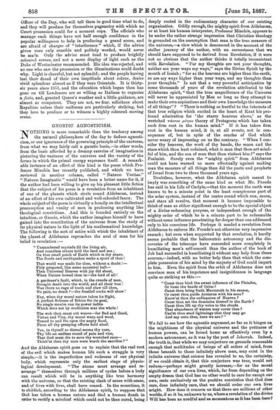TBE PEOPLE AND THE JUBILEE.
DURING the great "function" of the week, nothing has struck us—who, unhappily, remember many great func- tions—more forcibly than the change in the disposition of the people towards them. They like them more than ever, but they reverence them a great deal less. It is a little difficult to give concrete evidence of the latter assertion ; but we think its truth will be acknowledged by all who heard many criticisms of the preparations, or who mingled at all freely with the crowd on Jubilee Day. The people, and more especially the middle class, were not at all willing to accept arrangements as if they came down from heaven, or as if they themselves had no part to play except as spectators, and every rumour that the stateliness of the show was to be diminished elicited a chorus of remonstrance so loud and determined that, if we mistake not, the Court itself on one occasion issued an explanation which was very like an apology. The people insisted on the cream- coloured horses, and a long route, and a procession in state, as if it was their business, and not that of their superiors, to decide. When the first portion of the cavalcade appeared, there was no enthusiasm whatever for "the Royalties," who on their return were received in a silence, due no doubt, in part, to irritation at the closed carriages, which was hardly mannerly towards the nation's guests. The Crown Prince of Germany, who was riding, clothed in the uniform of the White Cuirassiers, was admired as a stately personage in a grand dress ; but the remaining Princes, even when actually reigning, excited marvellously little attention and no reverence. The Queen alone excited both, being followed throughout her journey of miles by that wonderful, slow- moving roar, which is so utterly unlike every other sound heard in the world, and which seemed on Tuesday positively to be a moving thing keeping pace invisibly with her Majesty, and hang- ing over her as she drove. Even in the Queen's ease, too, there was a change indescribable, but unmistakable ; an increase of kindliness and affection, but a decrease of awe. It was a friend of all who was welcomed, rather than a great Sovereign. We heard, too—though that, of course, might be an accident of personal position—much more than usual of men who stayed away, or re- fused tickets to the Abbey, or declined attractive windows from a sense that the ceremonial had no charm for them, that they could not enter into its supposed spirit, and that they did not care to weary themselves with seeing a mere spectacle. Some of these persons felt, it is true, the historic aspect of the incident, and were pleased that it should occur ; but they did not feel its solemnity in any other way, or care for it in the least because it was royaL Their imaginations were not touched, and they would have been as much impressed with any other occasion for a great spectacle, or, indeed, with a spectacle of a purely theatrical kind. That royalty was present was unimportant in their eyes, and any obligation to attend, such as Peers and Members, for instance, felt, would have been regarded as an uncompensated source of weariness. The competition for tickets to the Abbey was unprecedented, but so also, we believe, was the number returned upon the managers' hands. The whole affair, in fact, was regarded by the cultivated as a ceremonial, one quite unobjectionable and even graceful, but also one about which deep feeling would have been a little ridiculous. The one deep feeling was that there should be no interruption to the proceedings, and especially no interruption from the Anarchists, who were regarded as much more likely to be dangerous than
the Irish, and who might, it was thought, be excited to madness by the possibility of offering up a hecatomb of Kings.
On the other hand, the interest and the pleasure felt by the body of the people of all classes in the Jubilee as a show, sur-
passed everything we can remember. The desire that it should be adequate to the occasion, should be grand or even pompous, and not mean, was absolutely universal. The division of the procession into three involved great waiting, with little except the crowd to look at in the intervals ; but it was strongly approved, because it increased the length and stateliness of the whole affair. The people wished the pro- cession longer and brighter than it was (it really looked at points like a river of gold and scarlet) ; they craved for a long. drawn and, as it were, satiating splendour of colour; and they would have been delighted if the military display had been greater, if the naval display had rivalled the military, as it ought in a kingdom like this to have done, if an infinitely larger Oriental element had been introduced, and if every foreign Prince upon the ground had been attended by his own guards. The willingness to decorate was never so great, yet the spec- tators desired that the decoration should be still more splendid and universal. The lower classes in particular talked of and criticised "effects" in a way quite new in London—they have all caught up that word in its artistic sense—and appreciated instead of ridiculing magnificent uniforms. The crowd even cheered a Spanish footman who stopped the procession by losing, in a rather clumsy fashion, first his hat and then his shoe, on account of the magnificence of his dress. The Indians were quite popular, because their costumes came up to the popular requirements in the way of effect ; and the Crown Prince of Germany would be surprised if he knew how greatly the separateness of his appearance in the cavalcade increased his popularity. This craving after effect, a craving like that which makes theatrical speculators now spend such vast sums on the upholstery of their set scenes, was still more strongly displayed at night. The good-humour of the masses was as extraordinary as their obedience to orders. They were as content as men who see a grand performance with free passes ; but they were critical too, and the Leader of the Commons will find that his unequalled display in the way of an illumination has made him better known in London than either his motions for the Closure or his newspaper-stalls, and that his taste and liberality have helped to make his seat secure. So strong was the feeling, so keen the visible enjoyment of the vast crowds at any exhibition which they thought splendid, that we believe when London is next called upon to keep festival, the shyness of the better class will disappear, that the streets will all be placed in the hands of committees, and that the won- derful resources of English upholstery will be so utilised that London for a day will surpass Rome in carnival. It is only shyness, as we have said before, which prevents Londoners from showing their treasures of coloured draperies outside their windows. The people wanted a carnival, would have rejoiced in one, and would have spent all necessary money in profusion. Indeed, the middle classes did spend with an amazing lavishness. The preposterous prices asked for rooms, windows, and seats were real prices, and never came down even when the procession was already on its way. There were not enough five-guinea seats for the buyers, and the tradesmen of Regent Street were ready to cry at the loss they sustained by the procession not marching down their way. Again, London is the world's store- house of all things, from tigers and old Japanese enamels, down to the little glass vessels with night-lights in them, which, if only need freely enough, make such effective aids to illumina- tion. Even the resources of London, however, have limits, and a week before the Jubilee Day the price of all manner of lamps rose to alarming figures, without the smallest effect in checking the readiness to illuminate, which broke out in streets utterly removed not only from the line of procession, but from any of the more usually thronged thoroughfares. There is, in fact, the most complete readiness to spend, if only splendour may be produced ; and next time, we do not doubt, there will be infinitely more combination, and with it effects of which as yet the populace have hardly dreamed. They have never seen London either decorated or illuminated street by street, each street with an idea in it, and cannot conceive what Bond Street would be if turned, as it might easily be, into a Bezestein for a night. The people have grown, we will not say so artistic, but so capable of comprehending colour, that all they now want is a sort of Master of the Ceremonies, an Officer of the Day, who will tell them in good time what to do, and they will produce for themselves pageantry with which no Court procession could for a moment cope. The officials who manage such things have not half enough confidence in the popular willingness to help in producing a grand scene, and are afraid of charges of " interference " which, if the advice given were only sensible and politely worded, would never be made. Only the advice must tend to produce brightly coloured scenes, and not a mere display of light such as the Duke of Westminster recommended. His idea was rejected, and no one who saw the procession or the illuminations could doubt why. Light is cheerful, but not splendid; and the people having lost their dread of their own ineptitude about colour, desire vivid splendour almost as if they were Orientals. It is thirty- six years since 1851, and the education which began then has gone on till Londoners are as willing as Italians to organise a feeta, and, granted Queen's weather and a little guidance, are almost as competent. They are not, we fear, solicitous about Royalties unless their uniforms are particularly striking, but they love to produce or to witness a highly coloured moving scene.



































 Previous page
Previous page